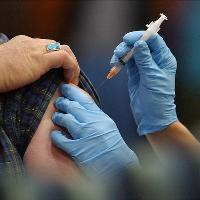Protect yourself and protect your pigs this flu season

In anticipation of this flu season, the Pork Checkoff is reminding producers, farm personnel, veterinarians and others who have contact with pigs to get the flu shot. The flu season can start as early as October and can last through May.
Dr. Liz Wagstrom, assistant vice president of science and technology for the Pork Checkoff, said, “Producers and swine farm workers can reduce the risk of getting sick and bringing the flu to the farm or workplace by getting vaccinated.
“The flu shot contains two type A viruses and one type B one. The A viruses may spread between people and pigs. The B virus is not of concern to the health of the animals,” Wagstrom said. Humans will develop antibodies that will protect them against infection with the flu virus two weeks after taking the flu shot, she added. The flu shot is available as an injection or in a nasal spray. “The Centres for Disease Control and Prevention, or CDC, recommends that pregnant women not get the nasal vaccine,” Wagstrom said.
Wagstrom recommends other practices to reduce the spread of infection among workers and of the pigs with human influenza viruses. Among them is modifying sick-leave policies to encourage workers to stay away from the farm if they are suffering from acute respiratory infections. “Virus shedding is at its peak when the clinical illness is most severe, but people may remain ‘contagious’ as long as the symptoms last, from three to seven days,” she said.
Good building ventilation and good hygiene also will reduce transmission of the flu viruses. “To prevent pigs and humans from other species’ influenza viruses, producers also should look at bird-proofing their buildings, protecting feed from birds and enforcing biosecurity practices such as the use of farm-specific clothing and footwear.” Wagstrom also suggested chlorinating the water used on the farm, especially if it is surface or pond water since migrating fowl and other wildlife may spread different viruses.
“The CDC has great information about the flu shot, who should get it and who should not. I’d recommend that everybody visit their Web site for more information,” Wagstrom added. The CDC’s Web site is www.cdc.gov.
The Pork Checkoff’s own fact sheet on influenza titled “Influenza: Pigs, People and Public Health” is available online here.
Click here for the free Pig Progress newsletter
“The flu shot contains two type A viruses and one type B one. The A viruses may spread between people and pigs. The B virus is not of concern to the health of the animals,” Wagstrom said. Humans will develop antibodies that will protect them against infection with the flu virus two weeks after taking the flu shot, she added. The flu shot is available as an injection or in a nasal spray. “The Centres for Disease Control and Prevention, or CDC, recommends that pregnant women not get the nasal vaccine,” Wagstrom said.
Wagstrom recommends other practices to reduce the spread of infection among workers and of the pigs with human influenza viruses. Among them is modifying sick-leave policies to encourage workers to stay away from the farm if they are suffering from acute respiratory infections. “Virus shedding is at its peak when the clinical illness is most severe, but people may remain ‘contagious’ as long as the symptoms last, from three to seven days,” she said.
Good building ventilation and good hygiene also will reduce transmission of the flu viruses. “To prevent pigs and humans from other species’ influenza viruses, producers also should look at bird-proofing their buildings, protecting feed from birds and enforcing biosecurity practices such as the use of farm-specific clothing and footwear.” Wagstrom also suggested chlorinating the water used on the farm, especially if it is surface or pond water since migrating fowl and other wildlife may spread different viruses.
“The CDC has great information about the flu shot, who should get it and who should not. I’d recommend that everybody visit their Web site for more information,” Wagstrom added. The CDC’s Web site is www.cdc.gov.
The Pork Checkoff’s own fact sheet on influenza titled “Influenza: Pigs, People and Public Health” is available online here.
Click here for the free Pig Progress newsletter











